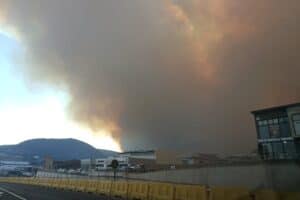Former company director Harlow swapped views of high rises for vineyard landscapes.

He calls it the “promised land”, the Bot River Valley outside Cape Town.
This is where businessman Gary Harlow has swapped views of high rises for vineyard and canola-covered landscapes and boardroom boredom for a sunset glass of wine on a large stoep.
Gary Harlow has swapped views of high rises for vineyard and canola-covered landscapes and boardroom boredom for a sunset glass of wine on a large stoep.
Tranquillity
The former director of Blue Label Telecoms, Cell C and Unihold has semigrated to what he
thought, at the time, would be more tranquil climes.
But entrepreneurs never rest on their laurels, and buying a wine farm has been anything but a vanity
project for Harlow.
He didn’t just decide to buy a wine farm as a side-bar to life and a building block for some kind of legacy.
Harlow’s Wildekrans Estate has been a labour of love – and a giant challenge.
ALSO READ: Eight restaurants to visit in 2023
But he’s built one of the most successful estate wine enterprises in record time, and in a very competitive local and global marketplace.
But more than that, Harlow’s the kind of man anyone can shoot the breeze with. There’s no pretence, and he’s equally comfortable in flip-flops and a T-shirt as tying a Windsor knot around his collar and slam-dunking a boardroom negotiation.
The history
Wildekrans grows about 13 different varietals on 70ha of land and produces about 150 000 bottles of wine every year. Of these, about 20% get exported.
Harlow recites the Wildekrans history as if he was there at the time when the area was a refreshment outpost for the Dutch East India Company in the 1700s.
The farm, as it looks today, was shaped in the ’80s by the family that Harlow bought Wildekrans from.
All things being equal, it’s a relatively young estate in that sense, but its place in the broader story of the area is significant.
A narrative steeped in the past, Wildekrans’s journey goes back to the late 17th century when explorers ventured out of Cape Town in search of meat and dairy, traversing the challenging terrain that would later become fertile vineyards.
The Wildekrans estate encompasses parts of three former farms, each with its roots in the rich tapestry of SA’s agricultural history.
“The farm has parts of three former farm in it as it was divvied up and shaped over the years. Originally, the larger farm was called Canaan because it was seen as the promised land.”
Winemaking
The passion Harlow has for Wildekrans is infectious as he describes the process of creating the estate’s award-winning wines.
He tells how the farm’s location, soil quality and relentless summer winds contribute to the unique flavour profiles of the wines. With a recent shift to an all-women team, including a female winemaker, he says
Wildekrans hopes to bring a more delicate touch to its offerings.
“It’s just different, there’s a different taste to wine when a female winemaker is at the helm of the creative process,” says Harlow.
He adds that the flavours and notes are more delicate and intricate, complex and “even if I say so myself, exceptional”.
Surviving Covid pandemic
He says the winemaking industry is still trying to recover from the pandemic.
It was a time when nobody knew whether they would harvest to see another vat. The ban on alcohol sales and exports caused Wildekrans to shed 40 jobs at the time.
“That was likely 150 dependants who had to go hungry because of bad policy-making.”
It remains a sore point for Harlow who says he’s just grateful that Wildekrans survived the onslaught. Not all estates have been as lucky to recover, albeit slowly, yet.
Establishing a wine brand is all about the sweat – and more sweat.
Harlow says it requires huge amounts of patience and perseverance to get liquor stores and retail outlets, let alone the hospitality industry, to take notice of and, eventually, sell his wines.
“Winemaking is a long game, and that’s why estates pass from one generation to the next,” he
adds, “because it is a never-ending process.”
“I wore the soles off my shoes traipsing the streets to get Wildekrans served and available in shops.
“It’s not easy at all, and there’s no sitting back and enjoying the fruits of your labour because tomorrow, there’s another crisis, another challenge,” shares Harlow.
Marketing Wildekrans
Selling the brand internationally was equally a challenge.
“There are so many competing winemaking nations in the world, so many brands, and global distributors at first had no interest in adding yet another estate wine to their inventories.
“But we never gave up and eventually started generating interest and a measure of success.”
And so, the upward curve took root in sweat – and then came a dangerous segue.
Shortly after Covid sucker-punched the industry, Eskom tried to give it a knockout blow.
Blackouts coupled with the cost of diesel, to keep the lights on and the winemaking process on track, cost a small fortune and as with most industries in SA, it pushed the wine industry to its knees.
Harlow says it was just another hurdle and is philosophical about it.
He is a believer in success and works hard to attain it.
NOW READ: This Franschhoek hidden gem was named winery of the year






